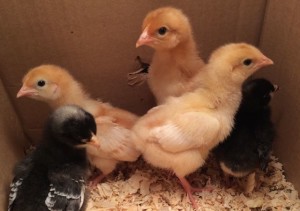 I’ve met many people who are interested in the idea of raising chickens, but are afraid it will cost too much or take too much time. I address some of these concerns in A Guide to Raising Urban Backyard Chickens for Busy People. This Chicken Planner goes one step further and provides detailed step-by-step instructions on what you need to get started. Just fill in your assumptions to update your personalized plan and schedule.The assumptions are based on my own experience and information you can find online, such as from Nutrena, Backyard Chickens, and Utah State University Extension.
I’ve met many people who are interested in the idea of raising chickens, but are afraid it will cost too much or take too much time. I address some of these concerns in A Guide to Raising Urban Backyard Chickens for Busy People. This Chicken Planner goes one step further and provides detailed step-by-step instructions on what you need to get started. Just fill in your assumptions to update your personalized plan and schedule.The assumptions are based on my own experience and information you can find online, such as from Nutrena, Backyard Chickens, and Utah State University Extension.
Describe Your Flock
Assumptions
Your Chicken Plan
If you have 4 chickens that hatched today…
Coop
You need a coop and run with at least 40 square feet.
Eggs
- Your chickens will start laying by .
- Your chickens will lay about 16 eggs a week.
Expenses
- Your chickens will eat about 8 pounds of feed per week.
- You will spend $3.20 per week on feed.
- Expect to spend about 10 minutes a day caring for your flock.
Your Chicken Schedule
Start date: today
You will need to prepare a healthy environment for your chicks and mature chickens. The first six weeks, you will need:
- Brooder box: a 24” x 18” x 12” cardboard box. If you have more than 10 chicks you will need something bigger.
- Incandescent lamp you can hang over the box for light and heat (about 60W is fine)
- Chick waterer
- Chick feeder
- 25 lbs chick starter feed for the first 12 weeks.
- 4 chicks (Wyandotte, Orpington, Australorp or Plymouth Rock recommended)
- Pine shavings or shredded paper to use as bedding.
Go to a nearby feed store to buy these.
From week 7 onwards, you will need:
- Chicken coop with at least 10″ roosting space per chicken, one nesting box for every 4 hens, and a total of 40 square feet in the coop and run. Find some local chicken coop builders.
- Nipple waterer
- Hanging Feeder
Weeks 1–2: today – two weeks from today
Daily tasks:
- Keep your chicks warm with the incandescent lamp. (1 min/day)
- Check feed and water twice a day, refill or change as necessary. (5 mins/day)
Weekly tasks:
- Change bedding every one or two weeks or as necessary. (10 mins/week)
Expect to spend about 10 minutes per day. You will likely spend more time than this because your chicks’ antics will entertain you for hours.
Weeks 3–6: two weeks from today – six weeks from today
- Raise the sides of the box or put a wire screen over your brooder to keep your chickens from jumping out.
- Gradually reduce the heat as the chickens’ feathers grow out.
- Make sure your chicken coop, waterer, and feeder will be ready by week 6.
- Prepare deep litter for your coop. Wood chips or straw are good.
Daily tasks:
- Check feed and water twice a day, refill or change as necessary. (2 mins/day)
Weekly tasks:
- Change bedding every one or two weeks or as necessary. (10 mins/week)
Expect to spend about 10 minutes per day.
Weeks 7–12: six weeks from now –
Put your chicks into their coop and set up the waterer and feeder.
Daily tasks:
- Check feed and water once a day, refill or change as necessary. (2 mins/day)
Weeks 13–18: 12 weeks from now – 18 weeks from now
Buy 50 lbs of grower feed and begin feeding them grower feed on week 13.
Daily tasks:
- Check feed and water once a day, refill or change as necessary. (2 mins/day)
Weekly tasks:
- Check cleanliness of coop and run. Remove manure and use in your compost or garden, or stir it in with deep litter. (10 mins/week)
From week 19: 18 weeks from now
Buy 50 lbs of layer feed and begin feeding them layer feed.
Daily tasks:
- Check feed and water once a day, refill or change as necessary. (2 mins/day)
- Check and collect eggs once a day (1 min/day). By , you should be getting several eggs a day.
Weekly tasks
- Check cleanliness of coop and run. Stir up deep litter and add more litter if necessary. Remove manure under roosts to use in your compost or garden, or stir it in with deep litter. (10 mins/week).
- Buy more feed as necessary



